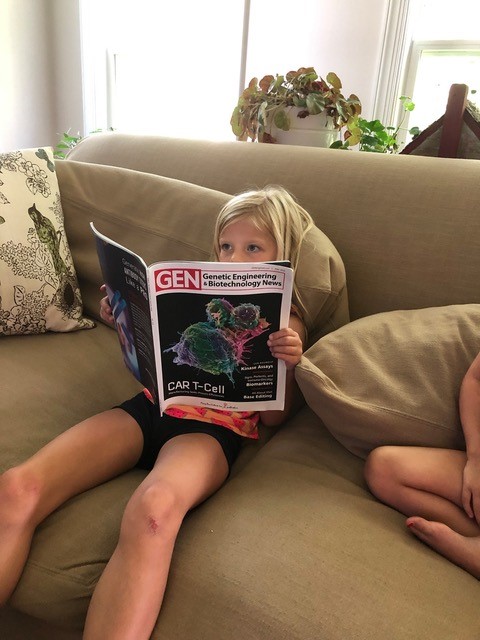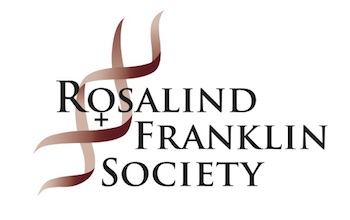RFS Briefings - July 25, 2019
We are pleased to include another issue of RFS Briefings with some timely and encouraging updates on women in science.
Of note in particular:
Happy Birthday, Rosalind Franklin
Today, July 25, we celebrate the birthday of Rosalind Elsie Franklin (July 25, 1920 – April 16, 1958) and take great pride in the Rosalind Franklin Society founded in her honor in 2008 by Mary Ann Liebert, president and founder of Mary Ann Liebert, Inc., publishers. The Society honors the achievements of Rosalind Franklin, a British x-ray crystallographer whose extraordinary work, though largely overlooked and under-appreciated at the time, was crucial to the discovery of DNA’s structure by James Watson and Francis Crick. The powerful symbolism of her remarkable story drives the Society’s agenda. For more about Franklin’s career, see The Rosalind Franklin Papers.
Recognition is also bestowed this week as the Wellcome Trust in London names one of its Board rooms after her.
2020 Lurie Prize on Biomedical Sciences
The Lurie Prize in Biomedical Sciences has announced a Call for Nominations for the 2020 Prize, with a deadline of September 12, 2019. The Prize, which recognizes outstanding achievement by a young scientist in biomedical research, will be presented at the Foundation for the National Institutes of Health (FNIH) Award Ceremony on May 20, in Washington, DC. The Prize is made available by a generous gift to FNIH by philanthropist Ann Lurie. Read more.
See below for more news about women in science
Please continue to share important news and opportunities with us so that we may share it with you and others who are committed to supporting the careers of exceptional women in science.
With regards,

Karla Shepard Rubinger
Executive Director
Rosalind Franklin Society
Happy Birthday, Rosalind Franklin
Today, July 25, we celebrate the birthday of Rosalind Elsie Franklin (July 25, 1920 – April 16, 1958) and take great pride in the Rosalind Franklin Society founded in her honor in 2008 by Mary Ann Liebert, president and founder of Mary Ann Liebert, Inc., publishers. The Society honors the achievements of Rosalind Franklin, a British x-ray crystallographer whose extraordinary work, though largely overlooked and under-appreciated at the time, was crucial to the discovery of DNA’s structure by James Watson and Francis Crick. The powerful symbolism of her remarkable story drives the Society’s agenda. For more about Franklin’s life and career, see The Rosalind Franklin Papers.
Wellcome Trust Renames Boardroom After Rosalind Franklin
Wellcome Trust has renamed one of its boardrooms after Rosalind Franklin, a decision driven by the Trust’s Women of Wellcome network. This gesture, intended to recognize women who have made a significant contribution to science, “is based on the belief that Franklin’s work is central to understanding DNA and is responsible for breakthroughs in science.” The Wellcome Trust is the UK’s largest charitable foundation. Read more.
2020 Lurie Prize on Biomedical Sciences
The Lurie Prize in Biomedical Sciences has announced a Call for Nominations for the 2020 Prize, with a deadline of September 12, 2019. The Prize, which recognizes outstanding achievement by a young scientist in biomedical research, will be presented at the Foundation for the National Institutes of Health (FNIH) Award Ceremony on May 20, in Washington, DC. The Prize is made available by a generous gift to FNIH by philanthropist Ann Lurie. Read more.
Police in Crete Say Suspect Admitted Killing American Scientist
Suzanne Eaton, a prominent developmental biologist who had been in Crete for a conference, died as the result of a criminal act. Dr. Eaton, aged 59, led a research group at the Max Planck Institute of Molecular and Cellular Biology and Genetics in Dresden, Germany and was a professor at the Biotechnology Center of the Dresden University of Technology. She was reported missing on July 4, and a 27-year-old man confessed to the crime. Her body was found on July 8. A tribute page to her on the Planck Institute described her as “’a world-class renowned scientist who was a key player in developmental biology.’” She was also an accomplished musician, black-belt, wife, and mother. Read more.
Murphy and Petry Win Awards for Excellence in Cell Biology
Princeton biologists Colleen Murphy and Sabine Petry have won two of the three annual “Women in Cell Biology Awards from the American Society for Cell Biology. Dr. Murphy, who received the Award for Excellence in Research, is a professor of molecular biology and the Lewis-Sigler Institute for Integrative Genomics, and the director of the Paul F. Glen Laboratories for Aging Research. She is using genetic, molecular biology, and genomics to study aging at the molecular and cellular level. Dr. Petry, who received the Junior Award for Excellence in Research, is an assistant professor of molecular biology. She studies the microtubules – the skeleton of cells – that allow cells to acquire their shape, position organelles, move materials and segregate chromosomes during cell division. Read more.
Barbie Set to Release a One-of-A-Kind Doll to Honor Female Astronaut Samantha Cristoforetti in the Hope of ‘Inspiring Girls to Dream of a Future Without Limits’
The Barbie Dream Gap Project of the Mattel company, designed to “level the playing field for girls,” has singled out Samantha Cristoforetti – a 42-year-old fighter pilot, engineer, and astronaut – as an inspiration and role model to young girls around the world. She is the first Italian female crew member of the European Space Agency (ESA) and its only active crew member. According to the European Director of Marketing for Barbie: “’We are proud to launch this collaboration with ESA with a clear goal: to inspire girls to become the next generation of astronauts, engineers, and space scientists.’”
Read more.
First Brain Organoids Get Set to Travel into Space
Representing a new frontier, a cache of about 100 brain organoids grown from human cells launched into orbit on July 21. Stored in a remote-controlled microlaboratory on the International Space Station, the hope is that this launch, the first of an anticipated 10 missions, will help scientists answer basic questions about brain development and ultimately learn whether people can safely reproduce outside Earth. In future missions, scientists plan to launch organoids with mutations tied to autism, with the possibility that microgravity might improve autism models, according to co-lead researcher Alysson Muotri, professor of cellular and molecular medicine at University of California, San Diego. The storage cubes were designed by Space Tango, a Kentucky-based company. Jana Stoudemiere, Tango’s commercial innovation officer, emphasized the importance of microgravity in doing basic cell research as compared with such research on the ground. Read more.
Doctors are Still Sexist: They Believe Men are the Best Surgeons and Women Are Better as Family Physicians
Research by Washington University in St. Louis found a pervasive gender bias in the medical field that may partly explain why only one-fifth of surgeons are women. A study of 42,000 doctors’ responses to a recognized bias test showed that most doctors, regardless of gender, said that men make better surgeons and women are more suited to family medicine. Read more.
The Percentage of Questions Asked by Women at Academic Conference is Lower than Attendance Would Suggest
A new study led by scholars at Stanford University in California found that women at two national genetics meetings, over four years, asked questions that reflected a lower proportion than expected based on their participation. Women were more likely to ask questions when meetings generated conversation among attendees, however. The research also found that women asked more questions of female speakers, while men asked more questions of male speakers. Read more.
Dr. Collins Speaks to NPR’s Audie Cornish On His Decision to Decline Participating On All-Male Panels
In an interview with Audie Cornish, host for NPR’s All Things Considered, Francis Collins, Director of the National Institutes of Health, discussed his decision to decline speaking on what he calls “’manels’” – panels that exclude women. Dr. Collins reasoned that “It is time to end the tradition in science of all-male speaking panels” and those that do not fairly consider scientists of all backgrounds, which he attributes to implicit bias if not intentional bias. So far, most of the men he has heard from have been supportive. To address this issue in his own agency, Dr. Collins invited seven new members, all women, to join the advisory committee to the director. Similarly, he is recruiting women from outside the agency to serve as directors. Read more.
Learning to Know Myself
Carol Shoshkes, PhD, and RFS Board Member, shared her story with Stories in Science, an online journal created as part of the Stem Advocacy Institute (SAI), a Boston-based think tank. Dr. Shoshkes is Professor, Biology and Neural Departments and Affiliated Professor, College of Global Public Health at New York University. With an interest in science that started in public school in New Jersey, she said ”I can’t imagine a more stimulating, gratifying, and challenging occupation than being a scientist. It has truly been a privilege to have devoted the last forty-seven years to being a viral immunologist and a woman scientist.” Read more.
Brenda Maddox, Biographer Who Revealed Joyce’s Muse, Dies at 87
Brenda Maddox, whose biographies include one about Rosalind Franklin, died on June 16. In “’Rosalind Franklin: The Dark Lady of DNA‘” (2002), she brought heightened attention to Dr. Franklin whose contributions to the study of the structure of DNA were unacknowledged by James D. Watson and Francis H. C. Crick. Watson and Crick later received a Nobel Prize for the double-helix model. According to a book review in Newsweek, Maddox “’has restored to history the author of some of the most significant research in genetics.’” Maddox was a speaker at an early RFS Board Meeting. Read more.
What is the State of Inclusion in 2019?
New research from Deloitte shows that organizations are making efforts to cultivate inclusion, yet some biases still exist. A study showed that 77% of respondents believed their company fostered an inclusive workplace and 81% agreed that their workplace provided opportunities to connect with and learn about others with different backgrounds, identities, and experiences. These findings are a significant improvement over research conducted six years ago when most respondents felt the need to hide at least one aspect of who they are. Read more.
This World is a Simmering Hellscape. They’ve Been Watching Its Explosions
In an effort led by Katherine de Kleer, a planetary scientist at Caltech, researchers have released a five-year record of volcanic activity on Io, a moon of Jupiter, hoping others will find more patterns. The work, published in The Astronomical Journal, reports hot spots that glow continuously, with others that flare up and die back down. Though Dr. Kleer’s survey captures far more detail, another team including Julie Rathbun of the Planetary Science Institute in Tucson, AZ has monitored Io’s brightest volcanoes over two decades. According to Dr. Rathbun, Dr. de Kleer’s observations “’blow ours out of the water.’” Read more.
U.S. Women Near Milestone in the College-Educated Labor Force
A new Pew Research Center analysis of data from the U.S. Bureau of Labor Statistics reports that women are approaching a milestone in gender parity, with 2019 the first year in which they are a majority of the college-educated labor force. The significance of this finding is that educational attainment is correlated with income. However, though women are at parity in the overall college-educated labor force, they lag significantly behind in many specific occupations such as computers and engineering. In contrast, they represent the majority of college-educated workers in fields such as office and administrative support and health care practitioners and technicians. Read more.
BU Provost Speaks on Capitol Hill about Sexual Harassment in STEM
Jean Morrison, PhD. was invited to testify before the US House Committee on Science, Space, and Technology. She has a unique perspective on the subject of sexual harassment – the focus of the testimony – as a Boston University provost, a renowned geologist and professor, and a mother of a daughter in a STEM PhD program. The testimony is in advance of a vote on House Bill H.R. 36, the Combatting Sexual Harassment in Science Act. Toward this end, the House Committee is exploring lessons learned from colleges and universities and how they have acted to prevent incidents and claims of sexual harassment. Read more.
Addressing the Leaky Pipeline Through Mentoring and Support: A Personal Perspective
April M. Kloxin, PhD, Assistant Professor, Chemical and Biomolecular Engineering, University of Delaware, and a Pew Biomedical Scholar, addresses the diversity gap in materials science and engineering, especially for women. She argues that gender diversity plays a key role in producing innovative solutions to complex problems. An important influence on recruitment and retention in STEM, according to Dr. Kloxin, are the support structures within and across fields that promote mentoring and career-life balance that foster the success of early career STEM trainees and trainers. Read more.
Science Entrepreneur Needs Analysis Survey
With NIH funding, the Company Clinical Tools, Inc./Health Impact Studio, is building a simulation to support early career women scientists in considering the possibility of starting their own biotech or medical technology startup business. We have been asked to share a survey with our colleagues. Please complete this brief anonymous survey, and share it with your own colleagues.
Wings WorldQuest. Extraordinary Women. Extreme Discoveries
Wings WorldQuest was founded in 2002 to address gender gaps facing women in science and exploration by offering a platform for their discoveries and networking. Through its online newsletter, Field Notes, WINGS shares the stories of these extraordinary women scientists who are: “exploring our oceans, land and outer space; conserving endangered wildlife; researching and finding solutions to climate change; and sharing the knowledge they gain.” Here is a link to their July Field Notes. Read more.
Inspiring Young Girls to Read about Biotechnology
As a final note, we thought you might enjoy this picture capturing a six-year-old reading GEN: Genetic Engineering and Biotechnology News. GEN is Mary Ann Liebert, Inc.’s flagship publication, launched in 1980 as the very first publication of its kind for the field of biotechnology, and now the most widely read and highly regarded publication in the field.
 |


